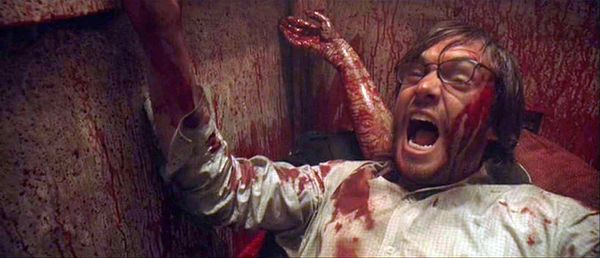Eye For Film >> Movies >> The Hills Have Eyes (2006) Film Review

As the problems that dominated America in the Seventies - lying Presidents, election tampering, prolonged and unjust wars abroad, oil crises, Middle Eastern terrorism - resurface to haunt the Noughties, so too do their horror films, now resurrected in "reimagined" form to tap right back into those same old anxieties. Unlike the originals, however, these remakes are not for the most part emerging from a genuinely independent underground, but from cynical studios hoping to cash in on the zeitgeist and, with the notable exception of Zak Snyder's Dawn Of The Dead, few have lived up to the impact of the original.
Even picking on a template that was a dud to begin with is no guarantee of improved quality, as has been amply proved by the underwhelming retreads of The Toolbox Murders, The Amityville Horror and The Fog. Far better than any of these remakes has been a recent run of looser homages to Seventies horror made as labours of love by fanboys who know the genre inside out. These have included Danny Boyle's 28 Days Later, Eli Roth's Cabin Fever, Rob Zombie's House Of 1000 Corpses, with its sequel The Devil's Rejects, and, last but not least, Alexandre Aja's Switchblade Romance, a terrifying psychothriller, which gave horror's "survivor" subgenre a whole new feminist twist.

Aja, therefore, seems the perfect choice to helm the remake of Wes Craven's 1977 "survivor" shocker The Hills Have Eyes. Despite being one of the films on which Craven's considerable reputation rests, the original Hills, with its ridiculous antagonists, its dog that keeps saving the day and its anticlimactic ending is difficult to watch for all the wrong reasons and certainly no horror classic; yet although Aja and his regular co-writer Gregory Levasseur never stray too far from the spirit of the original, even embracing some of its more glaring absurdities, they fully realise the lost potential of their inherited material by updating the dialogue, fleshing out the characters and bringing in a few fresh ideas of their own (or, at least, borrowed from other horror movies).
Tight-assed Cleveland cop "Big Bob" Carter (Ted Levine) is headed on a cross-country trip to California in a campervan to celebrate both his retirement and his 25th wedding anniversary and has dragged the entire Carter clan along, even his geeky Democrat son-in-law Doug (Aaron Stanford), with whom he does not see eye to eye. Directed to a shortcut by an eccentric gas station attendant in the middle of the desert, the Carters drive straight into a trap and soon find themselves falling prey one by one to the cannibal mutants that inhabit the surrounding hills. With his wife dead and his baby snatched for the pot, Doug heads to a nearby abandoned nuclear test village for a final showdown with the one family that he finds more frightening than his own.
Apart from an all-new prologue, the first two thirds of The Hills Have Eyes are remarkably similar to the original, with the details of the plot, and sometimes even entire lines, left largely unchanged. What has gone, and most certainly not missed, is the endless hillbilly chatter of the mutants, here mostly replaced with muted, vaguely doleful grunts (think No-Face from Spirited Away) that are considerably more unnerving - even if this necessitates the loss of my favourite scene from the original, where Papa Jupiter gloats angrily and at length over the (very dead) corpse of the one-time Carter patriarch.
Aja ramps up the tension, using distanced wide shots of the Carters to implicate the viewers themselves into the hills' voyeuristic menace. If the spiked chain on the road that stops their car evokes the recent Hills rip-off Wrong Turn, only Aja's film manages to get the viewer to care what happens to its characters, thanks to some economic touches in the script and deft performances from the cast. And, unlike Craven, Aja is working with a real budget, so that where the original Hills had to resort to the strange features of Michael Berryman, as the only indicator of the hill people's deformity, here very convincing make-up and some CG tweaking allow the mutants to look like genuine fallout victims in all their poignant hideousness.
In the world of horror, usually the family that slays together stays together, and in Aja's The Hills Have Eyes two families compete to prove this old adage, while a third, comprising the frozen Fifties mannequins of the test village, looks on impassively. These three rather different models of the American "nuclear" family form the core of the film's satire, and also its main point of divergence from Craven's original, in which no test village featured.
The climactic village scenes, with their focus on a degenerate family and (especially) a corrupted dining table, involve more than a passing nod to The Texas Chainsaw Massacre, but, unlike Marcus Nispel's 2003 remake of Tobe Hooper's 1974 classic, they do not shy away from the macabre mechanics of cannibalism. Yet amidst all the grotesque horror of this denouement, Doug's character arc from nerdy zero to new dad hero takes him through so much bloody punishment that he starts to become a bespectacled version of Ash from the Evil Dead franchise, a transformation whose comic nature is reinforced by the increasingly triumphant tone in the music that accompanies his emergence to gory glory. He may come close to being the mutants' breakfast, but even they, one suspects, would have to take him with a pinch of salt.
The resulting bloodbath, both nasty and hilarious, is a master class in the art of the remake, wavering somewhere between respectful reimagining and gleeful pastiche.
Reviewed on: 10 Mar 2006



















